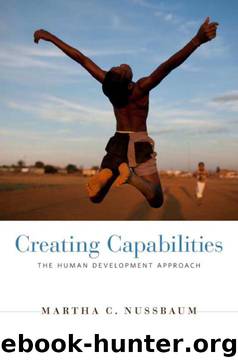Creating capabilities: The human development approach by Martha Nussbaum

Author:Martha Nussbaum [Nussbaum, Martha]
Language: eng
Format: epub
Published: 0101-01-01T00:00:00+00:00
6
THE NATION AND GLOBAL JUSTICE
The early versions of the Capabilities Approach focused on the nation state, asking how well nations were doing in promoting the human capabilities of their citizens. The comparative use of the approach in the reports of the United Nations Development Programme is also nation-centered, ranking nations against one another in a variety of ways, but saying nothing, in the rankings, about obligations of richer countries to promote the capabilities of people in poorer nations. (The Arab Development Report does, by contrast, focus on supranational regions.) My initial use of the approach to construct a theory of social justice focused, once again, on the nation, suggesting that the task of government, in each nation, is to provide support for the Central Capabilities of all.
The nation is not just a convenient starting place: it has moral importance. Nations-reasonably democratic ones, at any rate-are systems of principles and laws that have their ultimate source in the people. They are thus important expressions of people's autonomy, that is, their entitlement to live under laws of their own choosing. Thus key aspects of the Capabilities Approach, especially its respect for practical reason and for political empowerment, lead it to accord the nation a central standing and to pursue a world in which national sovereignty is protected for reasonably democratic nations. In such a world nations would not (as they risk doing today) lose their power to multinational corporations and global financial networks that have minimal, if any, accountability. Whether the nation is the only entity that has the right sort of accountability to be a vehicle for the expression of autonomy is an empirical question, but until now no larger entity would appear to be accountable enough. Even the European Union (EU) has deficits in this regard.
Nations may be large and diverse, like India, with its 350 languages and 1.2 billion people. They may be federations, like both India and the United States. But they have a unified basic political structure of which the constitution is a key part, and that document, which defines people's basic entitlements, has its source in "We, the people." (This phrase has become standard at the opening of democratic constitutions; for example, it begins the constitutions of the United States, India, and South Africa.) The EU has some of these features, but at present, at least, it does not have enough accountability and responsiveness to satisfy many of its constituents. If it ever moves in that direction, it will probably begin to resemble a federal nation like the United States and India. A world state, were one ever to come into being, would probably be very unsatisfactory from the point of view of human autonomy, because it would be too insensitive to the diverse views of people from different experiences and traditions.
The nation, then, has a moral role that is securely grounded in the Capabilities Approach, because the approach gives central importance to people's freedom and self-definition. And most democratic nations, wisely and efficiently administered, can do pretty well at securing for their people the capabilities on the list.
Download
This site does not store any files on its server. We only index and link to content provided by other sites. Please contact the content providers to delete copyright contents if any and email us, we'll remove relevant links or contents immediately.
Day by Elie Wiesel(2784)
The Age of Genius by A. C. Grayling(2589)
Gideon's Spies: The Secret History of the Mossad by Gordon Thomas(2353)
The Gulag Archipelago (Vintage Classics) by Aleksandr Solzhenitsyn(2103)
FATWA: Hunted in America by Pamela Geller(2013)
Columbine by Dave Cullen(1867)
Men Explain Things to Me by Rebecca Solnit(1728)
The Rule of Law by Bingham Tom(1698)
Anatomy of Injustice by Raymond Bonner(1669)
Examples & Explanations: Administrative Law by William F. Funk & Richard H. Seamon(1646)
Three Cups of Tea by Greg Mortenson(1618)
The Source by James A. Michener(1615)
That Every Man Be Armed by Stephen P. Halbrook(1583)
ADHD on Trial by Michael Gordon(1579)
Future Design by Unknown(1578)
Gideon's Spies by Gordon Thomas(1510)
Palestinian Walks by Raja Shehadeh(1497)
Constitutional Theory by Carl Schmitt(1455)
Nothing to Envy by Barbara Demick(1450)
